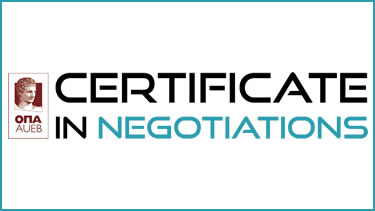- PROGRAMS
- Certificate in Negotiations
Certificate in Negotiations
Compare
Apply
Short Overview
The CIN program trains professionals capable of adapting to the requirements of each type of negotiation. This goal is achieved by combining theory and practice through:
- The program's structure, which covers all the heterogeneous knowledge required for a professional negotiator.
- The program’s 11 instructors, who are successful professionals in their own right, but also possess the required academic background.
- The eight Case Studies - Role Plays for honing negotiation skills, which are of the highest international standards, and for which the program pays a license to use them,
Learning Goals
At the end of the program, our graduates will be able to:
- identify each negotiation's case model based on 20 variables that include all possible criteria on the players’ behavior,
- adapt, according to each model's case, their behavior to 13 types of strategies, of which eight lead to agreement and the rest to non-agreement,
- integrate the program’s supporting and special topics accordingly, and
- handle complex practical negotiation cases.
Program Value
Our negotiation approach is interpretive, which allows the modeling of each case and consequently the prediction of the other side’s behavior, resulting in increased efficiency. All types of actions lead to negotiations if these actions affect the other player’s interests. Therefore, according to our concept: "Each relationship relates to negotiations". This is demonstrated by the fact that negotiation skills are essential in heterogeneous activities by, e.g., the following kinds of professionals:
- Managers (sales, procurement, human resource management, public relations, relationship management, finance, crises management),
- Lawyers & Mediators,
- International affair specialists,
- Communication specialists (etc.).
Evaluation Method And Final Grade Computation
Assessment is based on the following: (i) Multiple-choice quizzes at the end of each module, (ii) Eight negotiation simulation exercises, (iii) A final exam based on a 50-question multiple-choice question paper, (iv) ) A final assignment of 3,500 words. For the conferral of the training certificate, a final grade of at least 50% is required.
Learning Method Description
The program uses the eLearning educational method: learning takes place purely asynchronously (that is, on days and hours that serve the trainee, without mandatory attendance at a specific time or day), exclusively remotely (using a special educational platform via the internet from the trainee's area) and using digital educational tools such as video lectures, interactive self-assessment exercises, and other elearning tools that ensure effective and flexible individual self-learning. The program's training material becomes available at specific time periods, based on the training path followed, and then remains available on the training platform without restrictions throughout the duration of the program. If conditions allow, there are also live presentations on topical issues, questions on the part of the participants, and specialized negotiations exercises.
Program Website
Teaching Language
Greek
Application deadline: 11/02/2026
Program start: 03/11/2025
Program completion: 13/09/2026
Scientific area
Way to follow
Other important information
After graduation, the trainee attends one of the lecture cycles free of charge per year upon his/her request. In this way, the graduate is constantly informed about the relevant upgrades of the program or even "refreshes" his knowledge. Also, those trainees who have attended the Tailor Made Negotiations program will have a 25% discount on this program.
ECTS units: 11
Hours of asynchronous training: 200
Includes training hours (indicative) using an asynchronous distance learning (eLearning) platform.
Includes training hours (indicative) using an asynchronous distance learning (eLearning) platform.
Additional hours of employment: 130
Additional hours of work are included (indicative) and may include individual study, writing assignments, participation in field visits, participation in exams, etc.
Additional hours of work are included (indicative) and may include individual study, writing assignments, participation in field visits, participation in exams, etc.
Total hours: 330
The total hours include hours of synchronous and asynchronous training, as well as additional hours of employment.
The total hours include hours of synchronous and asynchronous training, as well as additional hours of employment.
Weeks of training: 36
Weeks in which activities of any kind are planned are included.
Weeks in which activities of any kind are planned are included.
Vocational Education and Training Certificate
Trainees who successfully complete the program are granted a Vocational Education and Training Certificate of the Center for Education and Lifelong Learning of the Athens University of Economics and Business, which is accompanied by a Supplement to the Certificate, detailing the subject of the program, the thematic units attended by the trainee , as well as the training methodology followed.
Target Audience
The following groups of professionals stand to benefit the most by participating in our program:
- Private & Public Sector Executives
- Freelancers: Entrepreneurs, Lawyers, Mediators, Insurers, Brokers, etc.
- Executives of the Armed Forces & Security Forces.
Prerequisite Knowledge
There are no format prerequisites
Scientific Coordinator
Program Tutors
Mode And Frequency Of Communication
For each question of a trainee, the Scientific Leader undertakes the relevant communication with the corresponding lecturer, as long as it does not touch his own responsibilities. Communication between instructors and trainees is purely asynchronous, via e-mails and/or personal messages through the training platform.
Cost
ELEARNING: 1800€
Installements
The total amount of tuition is 1800€ and is paid in 4 installments. The first installment, of €300, is paid as an advance payment before the start of the courses, to secure the position, and the other three, of €500 each, are paid during the program. In the event of a discount, the above amounts are reduced accordingly.
Trainees are informed of the installment amounts and related deadlines via email upon their acceptance into the program.
CONTACT
45, Kefallinias Str., 11257, Athens
-
dummy secretariat@diaviou.aueb.gr
-
dummy+30 210 8203 913
For the in Class programs:
-
dummydiazosis@diaviou.aueb.gr
-
dummy+30 210 8203 916, 912, 914
For the eLearning Programs:
-
dummyelearning@diaviou.aueb.gr
-
dummy+30 210 8203 753





